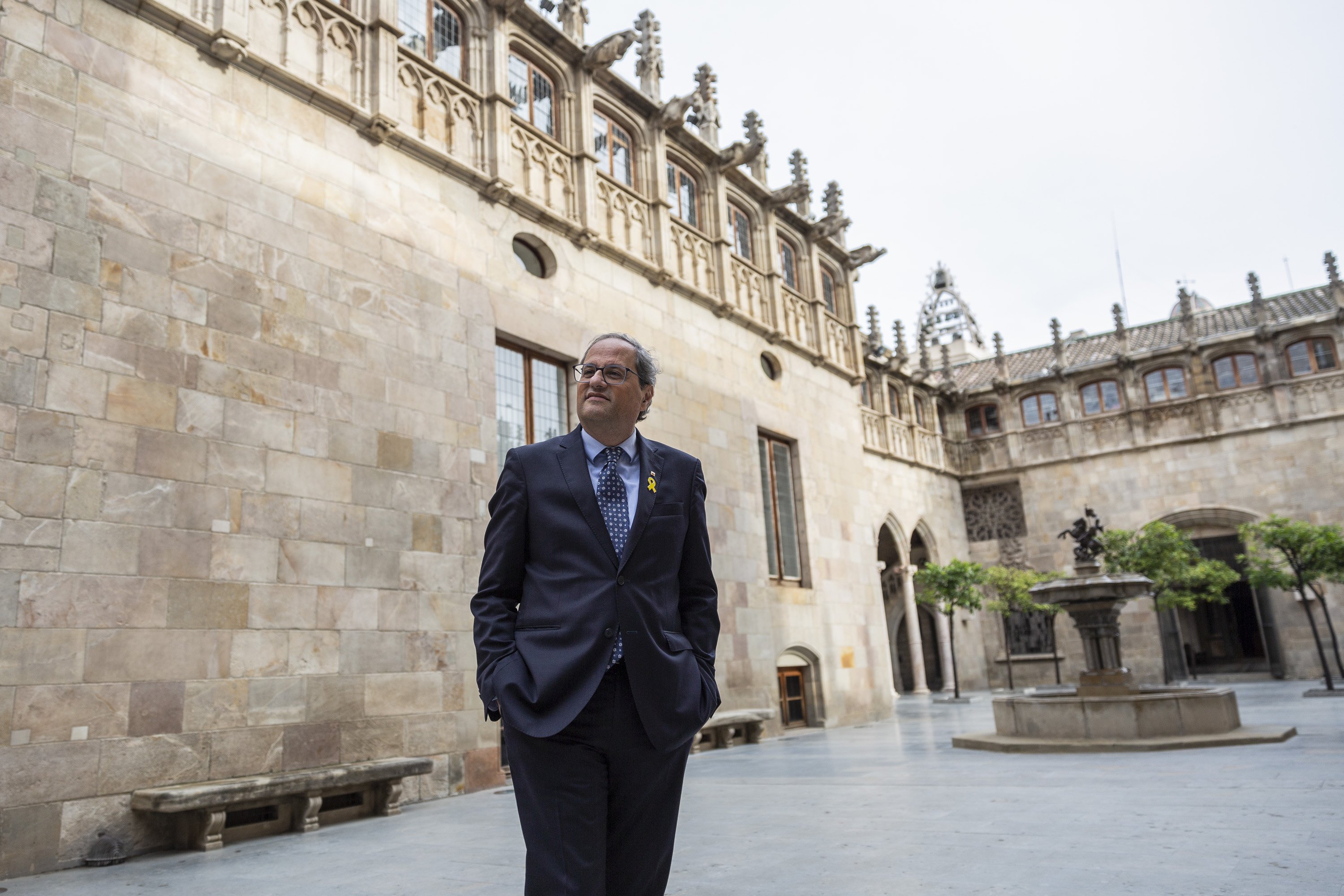Seated at the large table installed in the Generalitat palace room where he holds working meetings, Catalan president Quim Torra (Blanes, 1963) assesses - in an interview with El Nacional - the effect of the Spanish prosecutors' indictments against those accused in the referendum case. He warns that Catalonia is about to confront one of the most difficult moments in its history and he doesn't hide his satisfaction when he hears that he coincides with Republican Left (ERC) secretary general Marta Rovira, in her declaration that she will not accept any guilty verdict in the case. "We won't accept the sentences and that means reacting with the strength of the 3rd October", says Torra, referring to Catalonia's powerful national stoppage two days after the 2017 referendum. The president asserts that no implementation of article 155 will be enough to remove him from office and that the independence movement has learned from the mistakes it made in October last year.
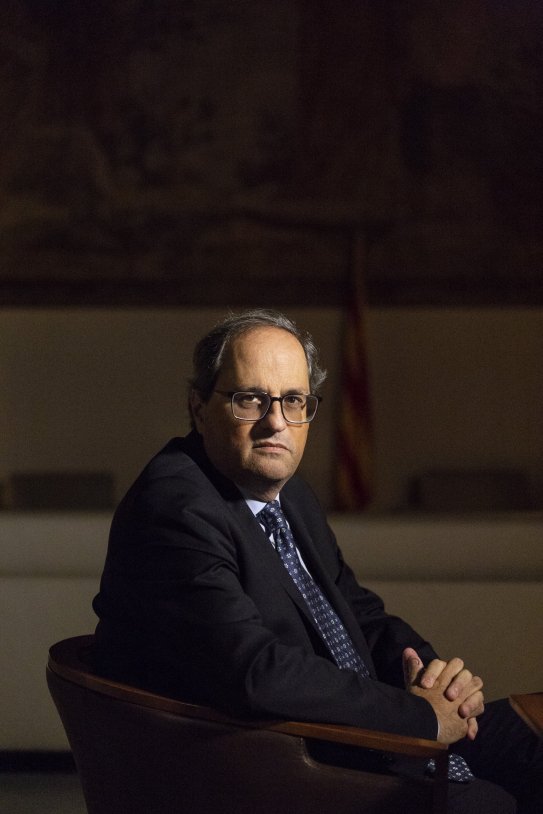
Photo: Sergi Alcàzar
This week the Catalan Parliament has undergone moments of tension. To the point where JxCat (Together for Catalonia) has asked the speaker in writing to take action against the insults from the opposition parties... What is happening?
There is a point of humanity in this question: for some it is a moral and ethical issue, for the others it doesn't touch their consciousness. This is leading us all to a point of high tension. And as for many weeks we've already been hearing expressions never heard before in this Parliament, with a lot of theatre, I think that, all in all, we have to find this point of dignity. We have decided that from now on we won't tolerate this behaviour which to us seems inappropriate in a parliament. The debate must be as tough as you like, as ironic as you like, obviously, but there are lines that are being crossed. And when they are crossed, we will complain.
The speaker of Parliament needs to take note of what has happened this last week
What response do you expect?
The speaker of Parliament needs to take note of what has happened this last week and in recent weeks and be aware that this can't be repeated, out of respect for the people we represent.
Do you feel insufficiently protected by the speaker?
It's not that. It's that we have got to a point where, simply, it's become normal for them to brand someone as a supremacist in Parliament; these are very serious insults.
Will you ask for the expulsion of the deputies who make the insults?
We will ask for the regulations of the Catalan Parliament to be applied. All deputies have a duty to maintain decorum and respect for their colleagues.
However, the PSC (Catalan Socialist Party) has also complained to the speaker after the Catalan president affirmed that the cynicism of [their leader] Iceta "trickled downstairs" ...
It was in that very session that we offered them our hand, thinking that a group like the PSC, given the sentences totalling 214 years of prison that were being demanded for their colleagues, would have an attitude of understanding, solidarity, fellowship, etcetera. I don't know.
In fact, you yourself had announced that there would be a hot autumn and for the moment, apart from that tension in Parliament, not much of the hot autumn has been seen...
It's the autumn that we could all anticipate, that we feared, the autumn of prison, of unspeakable injustice, of indecency. An autumn that started with a Diada rally on 11th September with more than a million people on the street and which allows us to be very optimistic about the level of mobilization of the people.
I have no sensation of having gone backwards in our objective of making the Republic effective
On the other hand, in terms of the actions of the government, you are accused of a certain disorientation, of not having a road map, of not being clear on where you're going.
We presented a government plan, theoretically for the whole legislature - I was prudent enough to say that there would be a point of inflection, at the announcement of the trial verdicts, but theoretically the plan is for the whole legislature - with hundreds of measures. And we govern every day. We are doing the job of governing every day, at the same time as building the Republic. I have no sensation of having gone backwards in our objective of making the Republic effective.
We are facing one of the most difficult moments in the history of Catalonia, which is what this trial will be
However, in the previous legislature there was a very clear road map, it was all pointed towards where we were going in the independence process, at least until the 1st October, and in this legislature it is not that clear what the milestones are.
From the restitution of the constitution, in a legislature which everybody is aware is extraordinarily difficult because of the extraordinary situation that we are going through. We need to be very careful, to have this long-term outlook, but also being highly aware that we are in a phase of pre-trial, trial and post-trial that will also mark the legislature decisively. For these phases that we are starting now, which I think we are reaching after these last two weeks with perhaps even more strength than we could have aspired to, the country has to be very conscious that we are still facing one of the most difficult moments in the history of Catalonia, which is what this trial will be.
For the moment, one of the difficulties that has got in the way of this legislature has been the relationship between JxCat and ERC, who went through a tense episode as a result of the debate in October on the rights to vote of the deputies who are facing court accusations. How is the relationship?
We took steps - and we made a joint declaration with vice president Aragonés - to seek this agreement. This is a coalition government, with the natural difficulties of a coalition government in an extraordinarily complicated period. Precisely because the time is extraordinarily complicated, I think that this agreement is more necessary than ever. Since that point in October we have kept working to plot out this common strategy that will ensure the stability of both the government and Parliament, and I think we are achieving it.
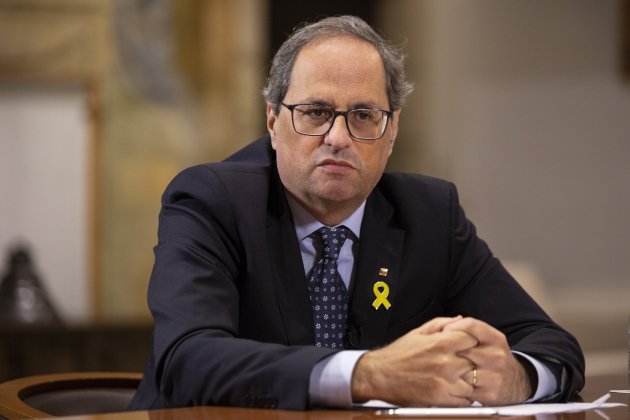
Photo: Sergi Alcàzar
The most important message for the elections in Barcelona is whether or not there is a pro-independence mayor. You only have to look at what has happened up till now when we haven't had one
Specifically, the municipal elections, and in particular the race in Barcelona, would be a moment to put to the test this ability to reach an understanding. Do you see any possibility of achieving a consensus electoral list?
At a time of national emergency like the one the country is facing, and given the importance of the capital of the country, I would adopt the call made by Lluis Llach at Lledoners: we are still capable of finding this republican unity. This is the most important message for the Barcelona elections, whether or not we have a pro-independence mayor, and you only have to look at what has happened up till now when we haven't had an independence-oriented mayor, or at the months of article 155, to see the great importance that it could have, and above all the great importance that it could have if the court verdicts come after the municipal elections and we need all the country's strength in order to be able to make the leap that we want to make.
As well, we have just heard the secretary general of ERC, Marta Rovira, making a very strong call for unity, in an interview in Catalunya Ràdio.
Very much so. I was in Geneva with her. I found that we were in complete agreement and today I once again feel very much in tune with the words of Marta Rovira.
Do you think everybody feels just as much in tune?
The whole independence movement today feels called upon more than ever to strive for unity, especially since the referendum case indictments, and in the face of the Spanish state's inability to make even the slightest movement towards the release of our colleagues, the return of the exiles and the right to self-determination.
But the fact is that, for the moment, there has been no change, everything remains the same in relation to this unity...
I hope that after this shock and this call, we are capable of reacting. We don't have much time to do so.
The indictments for the referendum case change everything: either we find unity or we won't have the strength we need
ERC does not hide its reluctance to talk about joint electoral lists...
The indictments by the public prosecutors and state solicitors change everything. Up till then we could have been talking hypothetically. With the announcements, we had facts, and in the face of facts you have to take decisions, and one of the decisions is: either we'll be capable of finding that point of unity that made the referendum possible in October 2017 to respond to the verdicts, or we won't have the strength that we need.
Could Quim Forn be a good candidate for a joint list in Barcelona?
I won't answer you about names because this is still a hypothesis and therefore it's better not to put names on the table.
However, your minister Elsa Artadi said that a list for the European elections led by Oriol Junqueras might be a good possibility...
I'd go along with it 100 per cent.
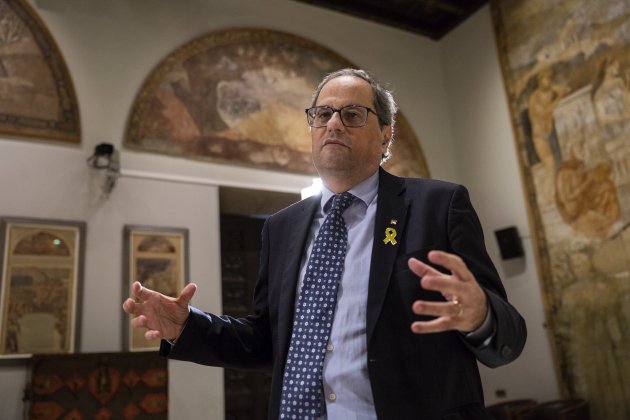
Photo: Sergi Alcàzar
Colau has had a government of highlights and shadows. Barcelona still doesn't belong to the Association of Municipalities for Independence
You say that in Barcelona we've seen what happens when there is no pro-independence government. Has Ada Colau disappointed you?
Mayor Colau has had a government of highlights and shadows. With a lot of good will, she attempted to bring a new type of politics to the city council, and maybe, probably resulting from the minority situation in which she has found herself, there have been many projects that have ended up with the city losing control over them. What the Barcelona city council needs is strong government, that knows where it's going, and especially at this moment in the independence movement, we need a pro-independence mayor.
Do you believe that Colau could have shown more solidarity with the independence movement?
I note, for example, that Barcelona is still not part of the AMI [Association of Municipalities for Independence]. There are things lacking for an independence supporter. I have to bring those to light. At the same time it's also true that in the forefront of civil, social and national rights, the [left-wing] Commons political group and mayor Colau are there and therefore I would also like to thank her. Now, for us there is not enough. Because of that we are in different spaces. But, for example, it also seemed important to me that the Barcelona city council voted to censure the king as the Catalan Parliament did. There is a great area of consensus in which we can come together and, in the definite move to make the republic effective, we would like to be able to depend on the Commons to be there.
Going back to the relationship with ERC, they promised to support the legislature at least until the verdicts come out for the referendum case, but is there a will to end it there or carry on to the end of the legislature?
That will depend on the verdicts. They could be - and we want them to be - verdicts of absolution or the abandonment of the case, which is what we have been calling for since the start. However, it is evident that if there is a guilty verdict, the legislature will be greatly affected by the Catalan people's reaction, through its representatives in Parliament.
The vice president is committed to presenting a budget and that's what we want, but it's possible we will run out of time
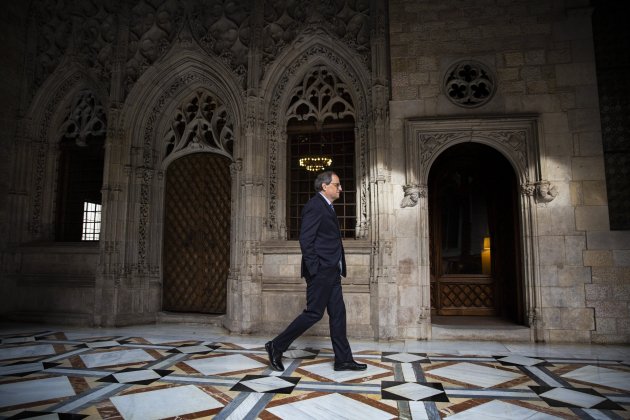
Photo: Sergi Alcàzar
Last Tuesday, Elsa Artadi warned that it was very possible your government's budget would not be ready in time and that, therefore, a time extension was necessary. Will there be a budget or not?
The vice president has made the commitment to present the budget and to start to negotiate them with the parliamentary groups, but we are at such a late stage of the year that it's possible we won't get there so that they can be applied if the new budget is passed. However, our will to get a new budget through remains, and for that reason we'll talk to the Commons and, if possible, to the [left-wing, pro-independence] CUP as well, to attempt to move it forward.
Do you see a possibility that the Commons will support it?
I see a great possibility. The objectives that they have set down for this budget, and the objectives we have considered when drafting them, are the same. And we are also willing to listen to claims made by the Commons for passing the budget in the Barcelona city council. Therefore, in terms of the negotiation of the budgets of Barcelona and Catalonia, we are open to a negotiation that is frank, broad and in as much depth as necessary.
Marta Rovira said it, we won't accept the verdicts. We will react with the strength of 3rd October: that will be the key
Marta Rovira has also come out in agreement with you in not accepting any guilty verdict, but what will the response be?
Yes, that is another very important point in which I coincide with Marta Rovira. This very point will be the key to the weeks ahead.
Why do you say it's important?
We keep on finding these common denominators. I think that Catalan society, this 80% that is against repression, is in favour of the Republic and the right to self-determination, will not accept the verdicts, as Marta Rovira has said. She said it: we won't stay on the sofa - where we never have stayed - and not-staying-on-the-sofa means reacting with the strength of 3rd October [the one-day national stoppage just after the 2017 independence referendum].
However, what does this mean? What will happen if there is a guilty verdict?
I think that what is important is not what will happen then, but what we are doing from today on so that what has to happen then has a possibility of success. What I have been asking for is this ability to organize, to get to know very well the nature of the moment we have reached, that we strengthen each of the entities, that we get ready for the verdicts. Now, it's not so important to know what will happen then, but to know that the independence realises the transcendental historical moment that it is facing and takes all its strength, its impulse, recovers that exciting spirit that allowed us to win on 1st October and know how to work with the strength which that gave us all on 3rd October.
You've talked about a new window of opportunity, a new 1st October...
A momentum.
Will it be this momentum?
It will depend on the people of Catalonia, on whether they believe that this is the moment. I would only say that the people of Catalonia must decide. I would mention, after the comments by Alejandro Fernández [president of the Popular Party] who says that I would be fired in the first minute of an implementation of article 155. No article 155 will sack me, only the Catalan Parliament can sack me. And, therefore, it will be the Catalan Parliament which will take the decision that at that time it wants to take. It is evident that there will be a political reaction. And it is evident that depending on the strength of hope in the work that will be done during these months we will be able to opt for one solution or another.
So different scenarios are being drawn up?
Yes.
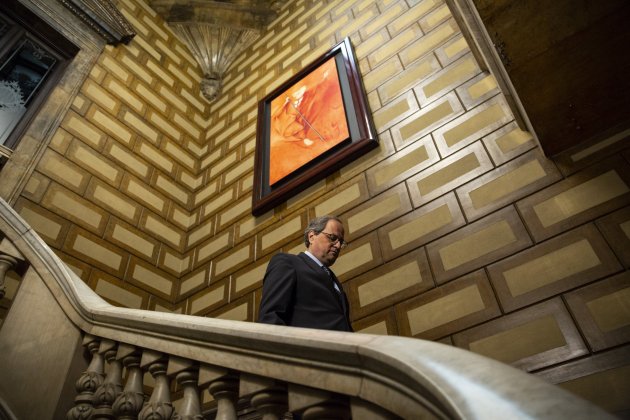
Photo: Sergi Alcàzar
The trial could be a platform to explain to the world what the Spanish state means for Catalans
With different responses?
Different responses depending on the work that will have been done all these weeks, the degree of consensus attained in the proposals to the Catalan people. I say it in the terms which my colleagues who are in prison said it to me the other day: Even if it seems a paradox, we want to go to trial. In this injustice, in spite of the months that are still to come. Because we want to go not so we can defend ourselves for doing nothing, we want to go in order to accuse the Spanish state, we want to go to unmask the Spanish state. For that reason as well, this trial is so important. It could be a platform to explain to the world what the Spanish state means for Catalans. And we, undoubtedly, will give them all our support. And I want to multiply myself at international level to denounce what the Spanish state is doing. I say this because all this seems to me very important to take into account in this pre-trial and trial phase. It has to end up bringing us to a point where we react collectively in the face of this injustice at the moment when it is necessary.
We have learned from what we didn't do well on 1st October last year. It would be unforgivable to make the same mistakes
Speaking about a new 1st October, does that mean that we have also learned from the errors that we made then? Won't we repeat them again?
Yes, we have learned. We have learned many lessons from what we didn't do well. Also from what we did do well. So it would be unforgivable to make the same errors.
You says that a new article 155 [suspending the self-government of Catalonia] will not remove you from the presidency of Catalonia...
No.
What will you do to prevent that?
I don't have to answer that question, the person who has to answer it is the leader of the government. What will that person do to remove me?
Must a pardon be accepted in the event of a guilty verdict against the prisoners?
The prisoners have said no.
And what do you think?
The same as what the prisoners think.
Llach shines through as one of the great figures of consensus in this very complicated world in which we all think we know the way to reach independence
You have brought back a key figure for the pro-independence consensus - Lluís Llach - and you have placed him at the head of the Council for the Republic...
Llach is one of those people who always have a constructive, positive vision. He was a deputy in the past legislature, he could probably say millions of things, but he maintains this tone of saying: we need everybody, we have to keep going forward, we have to push. And when I see other attitudes, negative ones, I find that Llach shines through, as one of the great figures of consensus in this very complicated world in which we all want to be coaches of Barça and think we know the way to reach independence. He simply says, I am one more, what I can do? This ability to put himself at the disposal of the country, which reminds me very much of Muriel Casals. They are great patriots.
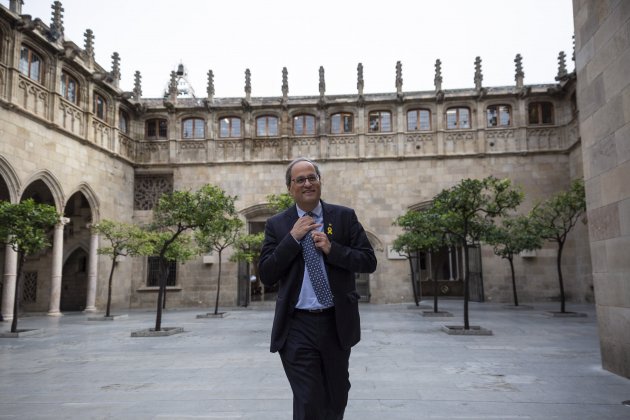
Photo: Sergi Alcàzar
Every five minutes someone from the PP or Ciudadanos calls for the application of 155 and to put them in prison now! How can it be that these people are telling you this
The Council for the Republic has also been set in motion, finally. It has been difficult...
It has been difficult because the situation is difficult, but we have achieved it. It is another of the instruments that will be essential in the months to come, because it acts from the free space. The mere fact that we say 'free space', is enough to show that something is happening here. It would not occur to anybody to say right now that in Catalonia we are a free space, because it's not true. Every five minutes some leader of the PP or Ciudadanos or whoever comes out with the suggestion of applying article 155 and putting them in prison now! How can it be that these people are saying this to you every five minutes! Well, in [other parts of] Europe this doesn't happen. In Europe there is the liberty to be able to explain yourself with complete calm.
And the prisoners, what part do they have?
We have always spoken about the three major lines of action for the Republic: the Council for the Republic, the Catalan institutions at home, and an organized and mobilized citizenship. I will add a fourth, which are the prisons. For me, the prisons are a very important political space in the times ahead. From the prison a very clear political message has to be heard, denouncing and accusing the Spanish state of everything that has happened. If these four lines of action are capable of understanding the transcendental historical moment and we act together we will reach a moment...
And will they be able to?
I work for that. I only work because of that.
It seems to me key to reinforce Puigdemont now more than ever
The Council for the Republic is one of the spaces of coordination for president Torra and Carles Puigdemont. How is that coordination going?
It has gone very well from the very start. At the very start president Puigdemont told me: Quim, you are the president of the Generalitat, go ahead, you have all my support. Meaning, govern. I also said to him, president, you are the legitimate president of Catalonia and I govern so that you can come back. And, therefore, I think that we start from this mutual respect and from the fact that president Puigdemont is the leader of the coalition with whom I stood at [last December's] election. Beyond this, at international level he is the leader of the independence movement. It seems to me essential and key to reinforce president Puigdemont now more than ever.
What part has Puigdemont played in the decisions of the Catalan government?
I seek advice, and it couldn't be any other way, from many people, and naturally from the leader of my electoral coalition, to take the decisions that I end up taking. That seems quite a normal and usual thing to me. What would seem stranger to me is if I did not talk to people.
You have been branded as Puigdemont's vicar [with a subtext of 'substitute']...
I don't know where that started... People say many things.
What do you think of this accusation?
I think that they are wrong, very wrong, and it is a criticism that in particular depreciates the presidency of Catalonia. And I assure you that if there's anyone these days who is aware of the need to maintain all the prestige and authority of the presidency of Catalonia, it is me. And, above all, with respect to the decisions could be taken in the future. That seems very important to me. We have to be careful so that the prestige that the office has always had continues.
Next week it will be six months since you began presiding over the Catalan government, how are you handling it?
I'm well, very well, very positive, very determined, with the real hope that we will win, ready to move this moment forward. I have not come here to call elections, I have come to put the republic into effect, this is my commitment. With all my courage and all my strength. I haven't lost even a millimetre of the ambition I had when I was sworn in. It is also evident that this situation in which you see colleagues in prison, in exile, their families, those who are accused of crimes... you see everything happen, and when somebody is arrested, all this affects you, it hurts you and you wonder, how is it possible that this is happening for us, how have we reached this point. But instead of being discouraged by this, this encourages me to continue going forward and to engage with it even more, until the end, until we get there.
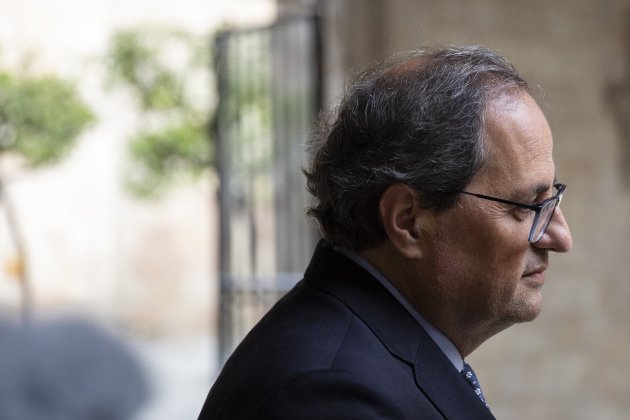
Photo: Sergi Alcàzar
Perhaps I feel more at ease with the people than with the parties
It has become a typical image to see you finishing events by talking to the people. Why?
I like very much to talk to the people. I think that we, those who govern, need to talk to the people and it is an opportunity. It seems very important to me that we show our faces. Governing is for the people. I feel very much at ease with the people. Perhaps I feel more at ease with the people than with the political parties. Moreover, I understand that it is not for anything special that I have done, it must be the magic of the presidency or something like that, but I feel very much supported. I go everywhere and I feel I receive many expressions of gratitude and affection. It seems to me I will never be able to give back all this support and solidarity to the people of Catalonia. It is extraordinary.
Have the dynamics of the parties surprised you?
Yes.
Sometimes I don't like things that I see [in the dynamics of the parties]. It gives me an uneasiness that we are not up to the task
Why?
One of the theatre plays I have most enjoyed is Noises Off (in Catalan, Pel davant i pel darrere). It was so funny. A comedy of entrances and exits. In the first act you saw a play from out front. In the second act they turned it round and you saw how the actors attempted to organize backstage, and the third act, in dire straits, is a crisis, again seen from in front of the stage. I am in the second act. I am seeing what you don't usually see when you are a member of the public. I am seeing this other side and sometimes I don't like things that I see. I don't like them at the moment. I think, how it can be that right now when we are giving it everything we have, a key moment in the history of the country, sometimes we are not up to the task of what the public asks of us and this does give me a certain uneasiness. I didn't plan on this. It has surprised me.
Part Two of the interview is here.

